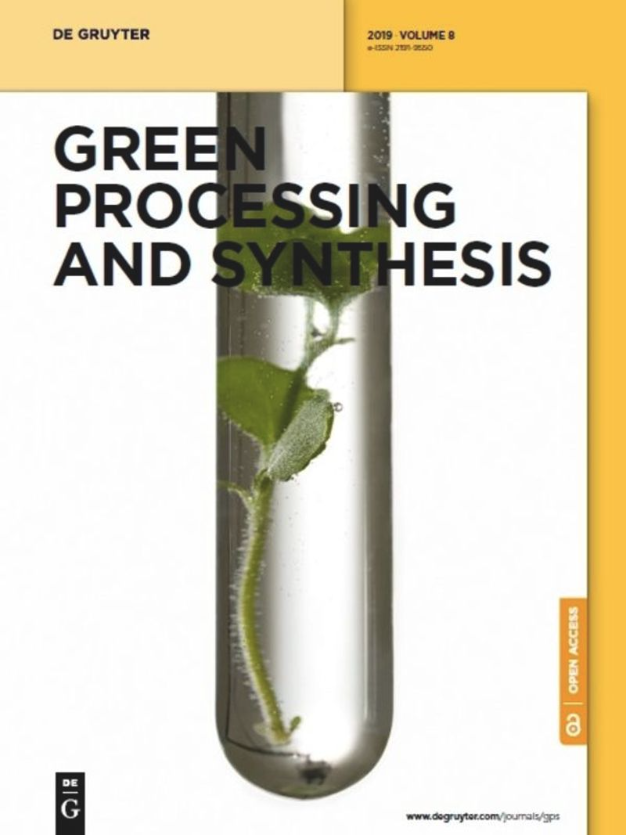Photocatalytic properties of ZnFe-mixed oxides synthesized via a simple route for water remediation
IF 3
4区 工程技术
Q2 CHEMISTRY, MULTIDISCIPLINARY
引用次数: 1
Abstract
Abstract ZnFe photocatalysts have been increasingly investigated for water remediation due to the high demands in this field, such as activity, toxicity, cost, and stability. The presented study was focused on the simple, safe, non-toxic, and eco-friendly synthesis and characterization of ZnFe-mixed metal oxides in correlation with their functional properties. Photocatalytic performance of these materials was evaluated by rhodamine B photodegradation under simulated solar light irradiation. The synthesized mixed oxides contained hexagonal wurtzite ZnO as the predominant phase, whereas, after thermal treatment, the formation of the spinel-structured ZnFe2O4 phase was observed. The photocatalysts with the additional spinel phase and thermally treated at 300°C and 500°C exhibited superior photocatalytic activity probably due to the highest amount of the ZnFe2O4 spinel phase, favourable mesoporous structure, and an optimal energy band gap of ∼2.30 eV that initiated higher light-harvesting efficiency. The rhodamine B photodegradation followed zero-order kinetics, indicating complete coverage of active sites by the pollutant substrate. Additionally, photocatalysts showed the highest efficiency at the natural pH (6.8), being in accordance with green synthesis principles. Simple, green route assembling synthesis method, high photodegradation efficiency, and good reusability make these ZnFe-mixed oxides great candidates for potential application in practical wastewater treatments.复合氧化锌的光催化性能及其在水修复中的应用
摘要ZnFe光催化剂因其活性、毒性、成本和稳定性等方面的高要求,在水修复领域得到越来越多的研究。本文主要研究了简单、安全、无毒、环保的锌铁混合金属氧化物的合成及其功能特性的表征。在模拟太阳光照下,通过罗丹明B的光降解来评价这些材料的光催化性能。合成的混合氧化物以六方纤锌矿ZnO为主导相,热处理后形成尖晶石结构的ZnFe2O4相。添加尖晶石相并在300℃和500℃下热处理的光催化剂表现出优异的光催化活性,这可能是由于ZnFe2O4尖晶石相含量最高,具有良好的介孔结构,最佳能带隙为~ 2.30 eV,从而激发了更高的光收集效率。罗丹明B的光降解遵循零级动力学,表明污染物底物完全覆盖了活性位点。此外,光催化剂在自然pH值(6.8)下效率最高,符合绿色合成原则。简单、绿色的路线组装合成方法、高的光降解效率和良好的可重复使用性使这些混合氧化锌在实际废水处理中具有潜在的应用前景。
本文章由计算机程序翻译,如有差异,请以英文原文为准。
求助全文
约1分钟内获得全文
求助全文
来源期刊

Green Processing and Synthesis
CHEMISTRY, MULTIDISCIPLINARY-ENGINEERING, CHEMICAL
CiteScore
6.70
自引率
9.30%
发文量
78
审稿时长
7 weeks
期刊介绍:
Green Processing and Synthesis is a bimonthly, peer-reviewed journal that provides up-to-date research both on fundamental as well as applied aspects of innovative green process development and chemical synthesis, giving an appropriate share to industrial views. The contributions are cutting edge, high-impact, authoritative, and provide both pros and cons of potential technologies. Green Processing and Synthesis provides a platform for scientists and engineers, especially chemists and chemical engineers, but is also open for interdisciplinary research from other areas such as physics, materials science, or catalysis.
 求助内容:
求助内容: 应助结果提醒方式:
应助结果提醒方式:


